What connects Cillian Murphy, Bon Iver, Steve Reich and Aaron Dessner?
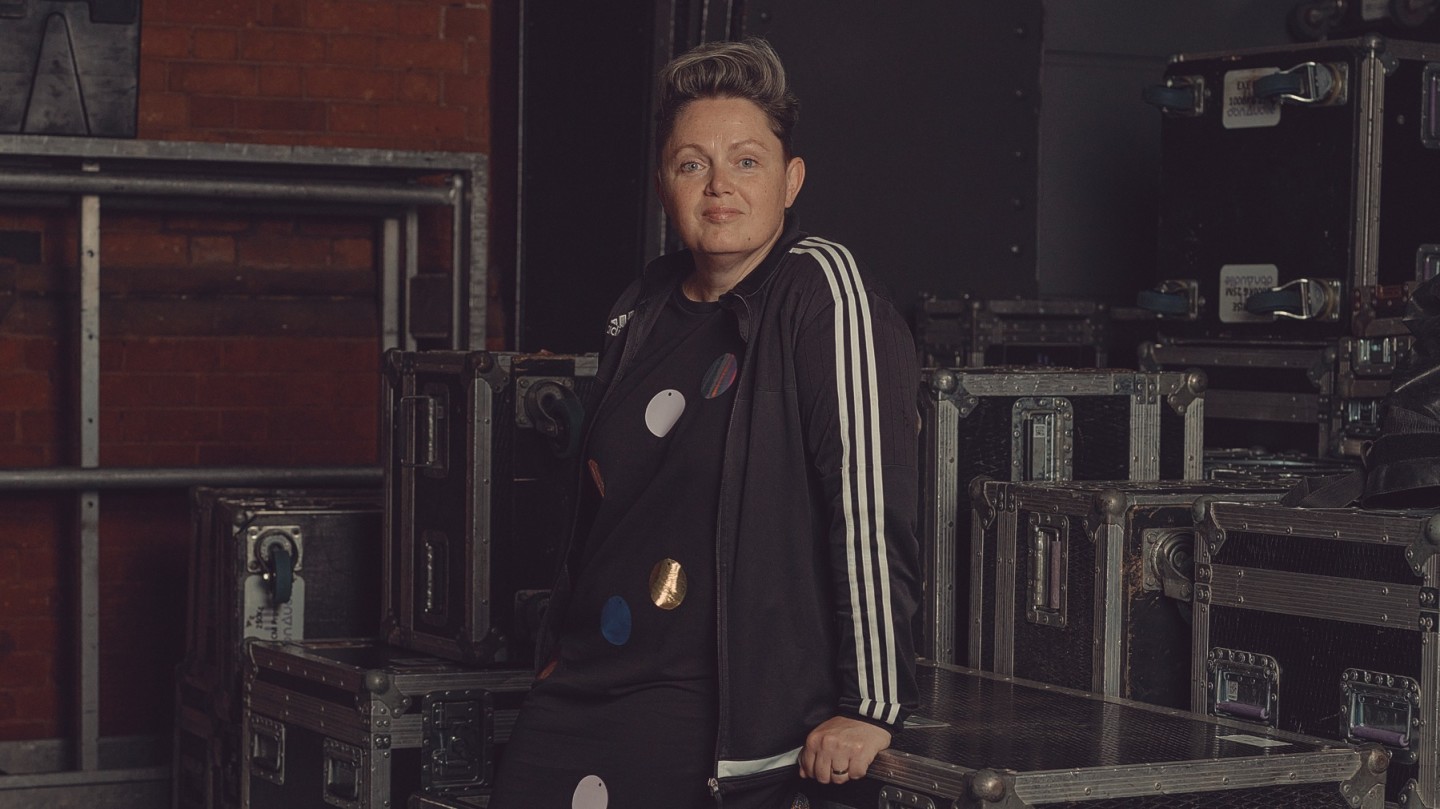
Simply sign up to the Arts myFT Digest -- delivered directly to your inbox.
In July, at the Manchester International Festival, a huge area in the city’s Central Convention Complex was filled with dark visuals and ambient noise. A crowd was led in. The Irish actor Cillian Murphy appeared on a large screen to deliver an intense monologue shot in the empty streets and marshes of London. As one of the first hybrid shows of the pandemic, All of This Unreal Time was described by reviewers as “riveting and immersive” as well as “grimy and electric”. It can now be seen online.
All of This Unreal Time had begun life as an abstract speech about human culpability written by the novelist Max Porter. Murphy, known for his work on everything from Peaky Blinders to Batman, had previously starred in a stage adaptation of Porter’s book Grief is the Thing with Feathers. The pair had been hatching this new project together, but it only really came together when Murphy brought his old Cork pal and occasional creative collaborator Mary Hickson on board.
Hickson’s day job is best, if vaguely, described as a creative producer. She jumps from organising events and festivals to facilitating unexpected collaborations and conversations, making detours to produce films, installations and music performances, and even some campaigning during last year’s US presidential election.
Now living in Carrigrohane, just outside Cork in the south of Ireland, with her husband and two teenage children, she is best known for launching the Sounds from a Safe Harbour festival (SFSH) in the city in 2015. The biennial event was due to have its fourth instalment this year before being curtailed like so much else by the pandemic. But in its three former iterations it developed into one of the most dynamic arts events in Ireland and established an enviable international reputation.
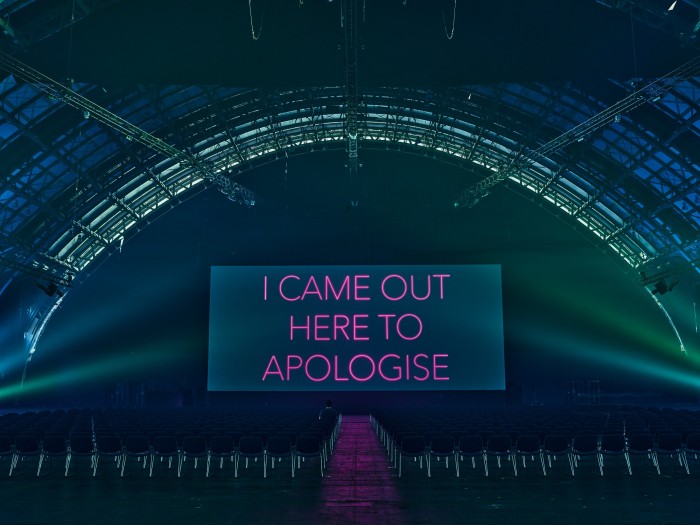
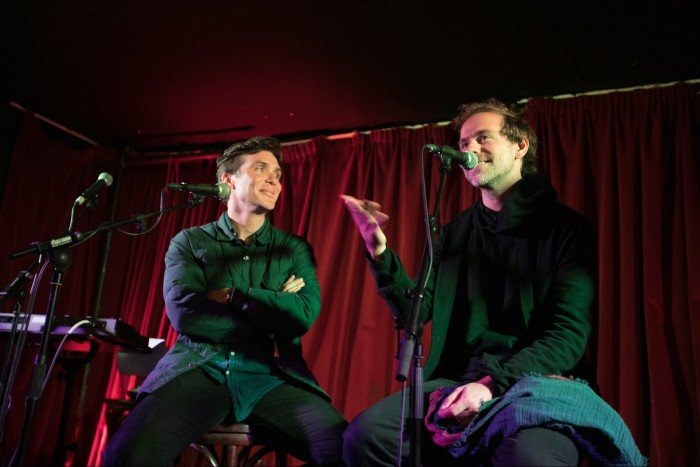
Hickson has the unique ability to seize opportunities, dream up big plans, cajole disparate people and figure out the sheer logistics of it all. This comes in many forms: filling a Berlin hotel with musicians and artists to spur a week of improvised performances, or staging gigs in caves. It has involved persuading the likes of American indie-folk icon Justin Vernon of Bon Iver and Bryce and Aaron Dessner of Cincinnati rock band The National to perform together in a church, when they could be playing somewhere five times the size with anyone from Kanye West to Taylor Swift (on whose 2020 album Folklore all three – particularly Aaron Dessner – played key roles). Her signature festival, SFSH, is co-curated with a run of men, all with higher public profiles: the Dessner brothers and Cork-born Murphy, as well as Irish writer Enda Walsh (who is married to How To Spend It editor Jo Ellison). Between the festivals, the group have used their considerable resources, clout and talent to put together an impressive array of performances. But it is Hickson who remains the beating heart of the project. The effusiveness with which her collaborators talk about her indicates the high regard in which she is held. (“Anything for Mary!” says Porter, when I speak to him.)
“I think the spaces that Mary is opening up in the creative culture are creating new forms of art because she’s empowering people to collaborate that wouldn’t necessarily be collaborating,” says Bryce Dessner. Alongside SFSH, Hickson has had integral roles in the Michelberger Music festival in 2016 and its follow-up, 2018’s People Festival, both held in Berlin, as well as in the wider People/37d03d. She has spent time as Bryce Dessner’s manager and been in the studio and on the road with the band. Since 2019 she has been director of the Eaux Claires Festival, created by Justin Vernon in his hometown in Wisconsin. And in the past year, despite the deprivations and restrictions of the pandemic, Hickson produced the project for the Manchester International Festival, curated a series of walking sound installations in Dublin and Cork, made a short art film, Éiru’s Threshold, and is currently the creative producer on a series of performances that began in Hamburg by the Canadian musician Leslie Feist. “She has a very specific skill set that I haven’t really found in other colleagues,” says Dessner of her prolific output. “Her input is more like an artist, it’s her artistic soul that is so important.”
At the same time, it’s not all about the sometimes overly serious business of art, or commerce for that matter. Adds Dessner: “It’s always about process and art and the experience of it, and just to have a good time. She’s never thinking in terms of how many tickets she’s gonna sell.”
Hickson was born in 1975 and grew up in Fermoy in the east of County Cork. When she was very young her family lived for a time above a pub in County Clare, where she absorbed a lot of traditional music. She was the second of four girls; her father was headmaster of the boys’ secondary school in Fermoy. Her mother worked for a time as a secretary at the school as well as being a holistic practitioner. There was always music around. She learned piano and sang in the choir. “We had an orchestra,” she says, before adding, with a characteristic display of self-deprecation, “I was first violin, which doesn’t say much for the orchestra.”
We are speaking through Zoom, of course, me in London, she at home in Cork. It’s a rare solo interview, and one gets the impression she would rather endure surgery than than make herself a focus. She comes across as friendly and relaxed, yet entirely detailed. Her hair, blonde and cropped tightly on the sides, sits architecturally high on top. Throughout our conversation I hear messages continually arriving on a phone in the background, hinting perhaps at Hickson’s process of non-stop work.
Music only became a serious proposition when she was applying for university. “It was literally the subject I was best at,” she explains. “So I was like, I’ll just do that.” Such an approach, both casual and determined, has always seemed to define her. “My entire career has been a series of following my very loud gut instinct,” she adds.
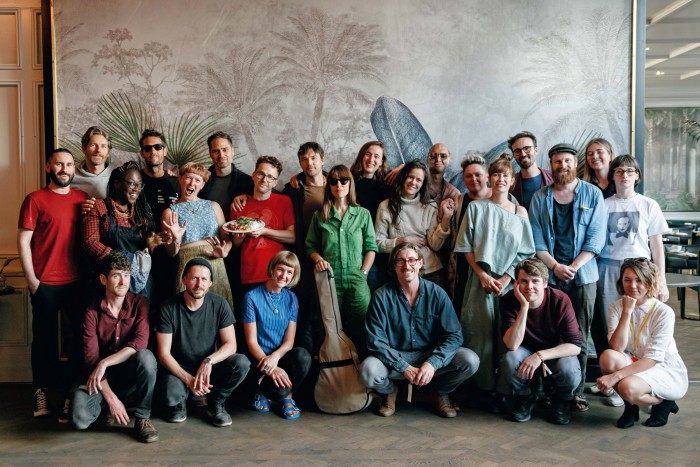
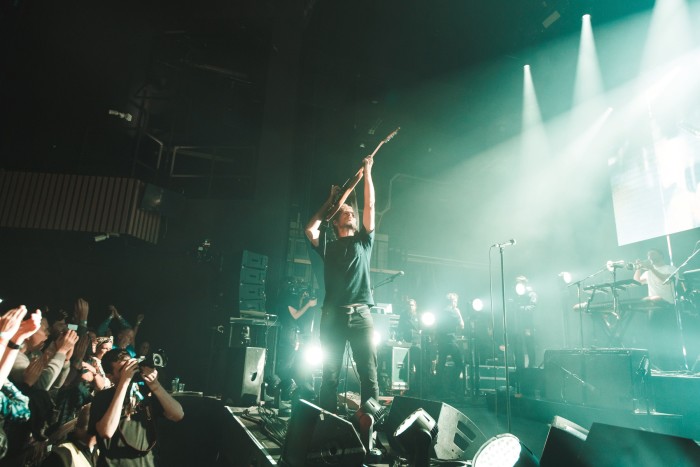
The instinct didn’t have far to travel – from Fermoy to University College Cork about 35km away. She originally studied piano and violin but more avenues soon opened up. She remembers passing a room and hearing drumming sounds emerging from it. A teacher, the Tony Award-nominated composer Mel Mercier, was in there. It wasn’t a class she had enrolled in and he asked her what she was doing. She wanted to sit in and listen, to which he said, “If you’re in the room, you have to play.”
“I went in with a very kind of conventional classical way,” she says, but came out playing Ewe dance drumming, performing in a gamelan ensemble, and playing the bodhrán. At the end of her third year Mercier told Hickson she couldn’t do another drumming module because he had taught all he knew. “Well, I’m going to the source,” was her response. Her gut then took her to the University of Ghana in Legon. By the time she graduated from UCC, she was teaching on the side as well.
There followed a master’s in ethnomusicology at the University of Limerick’s Irish World Academy of Music & Dance, where she heard a rumour of a world-music festival (“at the time it was an acceptable term”) being launched in Dún Laoghaire, outside Dublin. It marked an optimistic point in the early years of the Celtic Tiger when there was a growth of inward migration and multicultural communities in Ireland. She talked her way into a job, and the Festival of World Cultures developed into an annual weekend event that pulled in audiences of 250,000.
By 2009, she was married and raising two children. Her husband, Luke Hickson – he took her name – ran an architectural practice with offices based in Dublin, Cork and Kerry. When Ireland’s financial crash hit, they moved back to Cork.
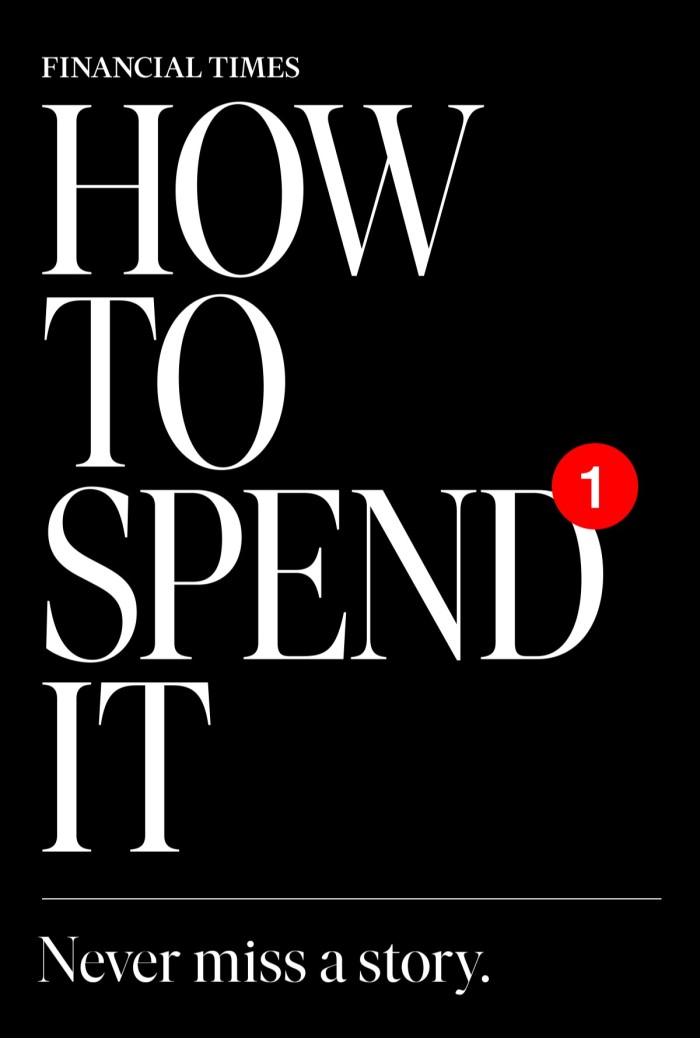
Sign up for our newsletter and get the best of the magazine straight into your inbox.
In the summer of 2010, in the midst of the recession, she saw a newspaper advert seeking a chief executive for the Cork Opera House. “Straight away I was like, well, that’s what I’m doing next.” By the end of her tenure in 2015, the Opera House was turning a profit and financially secure. “I really felt that the pressure to make it work was on my shoulders,” says Hickson, “to prove that it was possible for it to thrive – both creatively and financially – which I did and am very proud of that” She then adds something that could be her mantra: “We need the arts. Especially when other things are shit.”
A five-day event at the Opera House and across the city in 2011 with Steve Reich provided the first stirrings of Hickson’s next big leap. She sent a Facebook message to Bryce Dessner (“It sounds really lame to admit, but at the time it was acceptable”) asking him to take part in what would become the template for her SFSH festival. He couldn’t take part but a connection had been made.
They met in 2013, when The National were in town to play a concert. “He said he had 15 minutes, and two and a half hours later we were still talking and he’d missed the soundcheck and was being dragged off for the gig,” Hickson recalls. “But we had decided in that cup of tea, or several pots of tea later, that we would do a festival.”
“What I learned with Mary was that nothing is impossible,” says Dessner of their quest to bring together strands of alt-rock, folk, electronic, contemporary classical and experimental music. “She allows herself to dream in ways that even the greatest artists sometimes don’t.”
Bryce brought his brother Aaron on board, with Cillian Murphy and Enda Walsh following shortly after. Murphy and Hickson have a long history: their parents are friends and they knew each other as children growing up in Cork. “I was in a band in Cork and we used to play in the Opera House in the mid-’90s,” Murphy explains in an email. “Mary was a barmaid. We would have such a good laugh together and she used to give us free pints!”
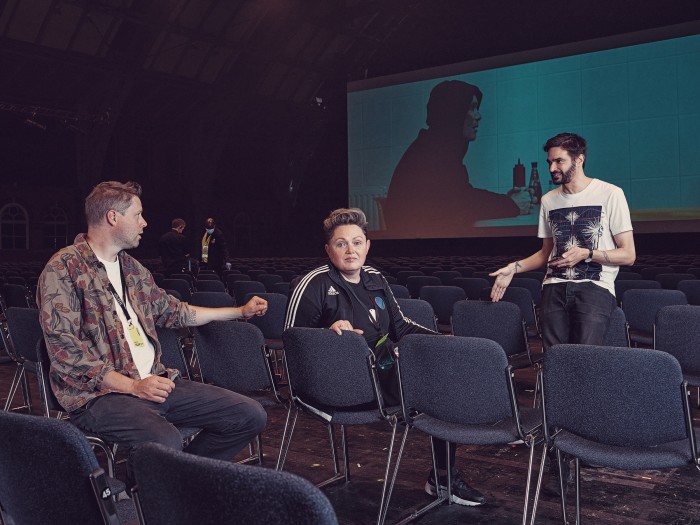
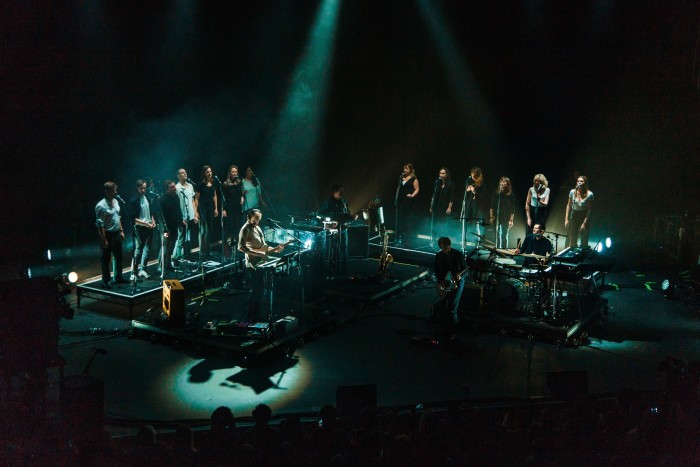
The first Sounds from a Safe Harbour festival in September 2015 featured the Dessners playing guitars up against the RTE National Symphony Orchestra. Icelandic artist Ragnar Kjartansson presented work made with The National. Irish/American folk supergroup The Gloaming headlined, and Irish indie folk star Lisa Hannigan performed along with Icelandic producer Valgeir Sigurdsson and American singer-songwriter Sam Amidon. The festival forged conventional headline-act performances with improvisations and conversations, and ranged across the city in venues hallowed and sweaty, in galleries, in empty warehouses, on the streets and in bars. The canvas has expanded ever wider. In 2017 the European TV network Arte broadcast performances from The National and Bon Iver. Cillian Murphy hosted a series of in-conversation events. The 2019 edition jumped from Leslie Feist, Efterklang and composer Dustin O’Halloran to Teac Damsa’s staging of Swan Lake.
“Because Mary is so laidback and everybody adores her, she makes what she does look easy,” says Murphy. “In fact there is tremendous rigour in every aspect. When she runs a festival it’s like she is everywhere at once. At every early-morning launch, at every late-night gig, but always with the biggest smile and welcome. And she treats everyone equally – that is key to her philosophy, I think.”
The connection with Bryce Dessner has propelled Hickson in myriad new directions. Justin Vernon met her at the 2016 event and they have had a burgeoning partnership ever since. “She made such a profound effect on me that week we met,” Vernon says, “that I felt compelled to share a song. We both cried. Ha! Nerds... But in all seriousness, it was one of those moments where I felt like my purpose as an artist was most fulfilled.”
By 2019 Vernon had asked her to become director of his Eaux Claires festival in Wisconsin. Her first edition was the Hiver festival in November that year – a 2020 event was cancelled because of Covid. In its absence, the pair worked on a “get out the vote” campaign during the presidential election using the arts to try to drive registration and engagement in Wisconsin, a state Joe Biden eventually won by less than 1 per cent.
“That cup of tea with Bryce opened up the world,” Hickson says, looking back on her recent collaborations. “You know, Bryce; through Bryce, Aaron; through Aaron, Justin. And through that kind of community that we are consciously nurturing, around four or five hundred musicians now that we work with around the place.”
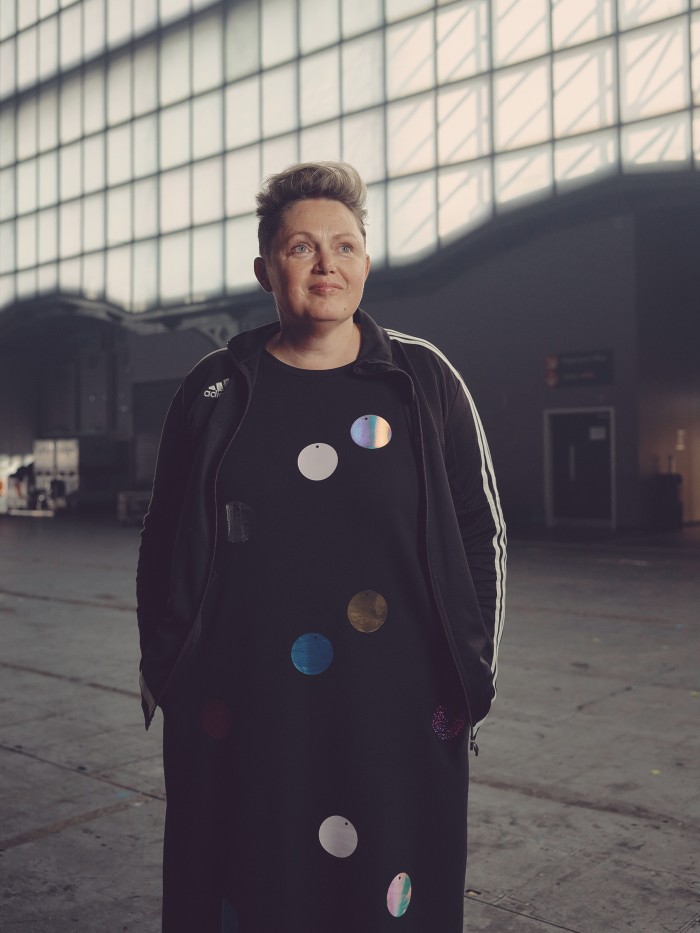
When we speak, she has just spent a week overseeing rehearsals from afar for a new production by Leslie Feist on which Hickson is the creative producer. Rob Sinclair, the production designer who worked on David Byrne’s celebrated American Utopia shows, was also involved. The performance, Multitudes, was staged in person with a small audience in Hamburg over five nights in August – with more residencies in Ottawa and Toronto coming next month.
“I felt like her mind was a Learjet. Her determination to foster creation and bring it to fruition on that scale made me a bit wide-eyed,” says Feist of her first encounter with Hickson, in 2018. “I’d never met anyone like her. As someone said, she had the most responsibility of anyone there, and also seemed to have the most fun.”
“I’ve been so lucky to have Mary advise me at crucial junctures,” she adds of Hickson’s direction. “She drives the practical with lists and deadlines and keeps track of nuances of new ideas. Like a horticulturalist managing oak trees, as well as tiny new shoots, she zooms in and out.”
As with any recent artistic effort, many projects have been scuppered, cancelled, truncated or restaged. Hickson’s recent experiences with the Feist show and All of This Unreal Time suggested first iterations of what is now an ongoing process, with many more explorations and performances to come. She’s also thinking about ways to more directly get involved in the music-making process. Lots of artists send her music and get her feedback in the recording process, but now she’s considering teaching herself how to use recording and producing tools so she can take a more active role.
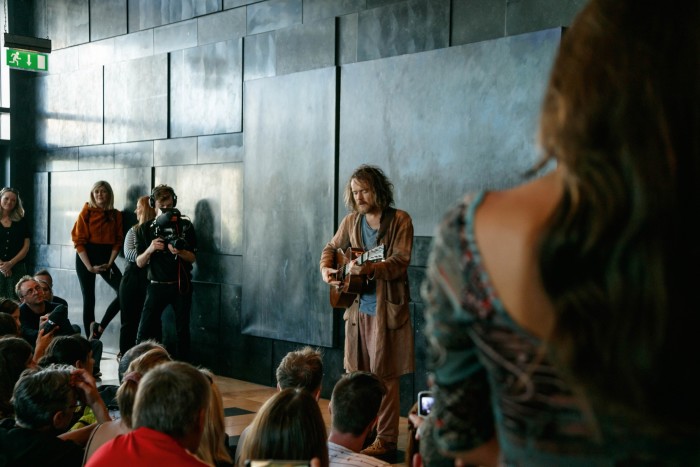
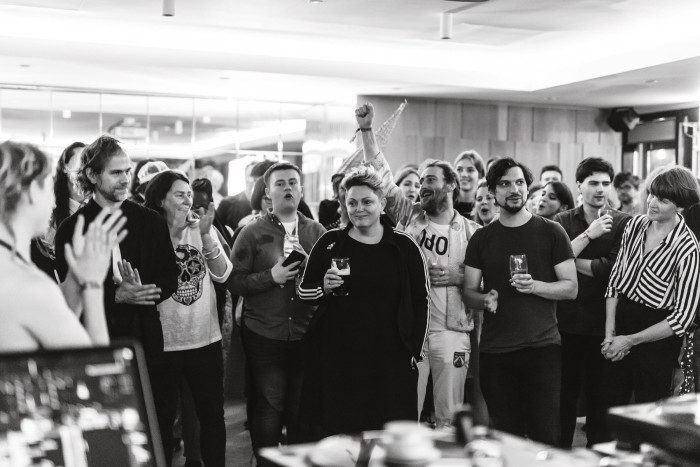
“Part of my desire to learn more in this area is to feel more in control in order to be more effective,” says Hickson. “Currently I have to sit back and wait for a solution when I would rather dive in and find it myself.” Finding such control and creating solutions has been a hallmark of Hickson’s work. And it’s something she is conscious of pushing more widely for other women too, given how male-dominated music production and her broader spheres of art production tend to be. “We have to be the change – sounds naff but it’s true,” she says. “I know so many talented females working in production. Where we can, we just have to provide more opportunities for them.”
In the meantime, Hickson thinks one of the benefits of lockdown is that it’s forced her to engage with more local artists and is developing plans to allow some of these people to create new projects in the coming year. Sounds from a Safe Harbour remains parked for now. There may be some residencies and snap events but it seems unlikely that they’ll attempt to make a full splash until the pandemic is further into the rearview mirror. Perhaps in 2023, she speculates.
And yet many more ideas are bubbling up. New and ambitious plans are continually coming, says Justin Vernon, “to set up more residencies and educationally minded events and platforms all over the world”.
Cillian Murphy echoes the sentiment with almost evangelical zeal about Hickson’s effect and artistic endeavour. “I would work with Mary again tomorrow,” he says. “She really is a miracle worker when it comes to connecting artists and creating laboratories for new work to emerge. The more artists that she continues to work with, the more the good word will spread among the community about how special a producer and person she is. It already has – so she probably won’t have time to work with me for years!”
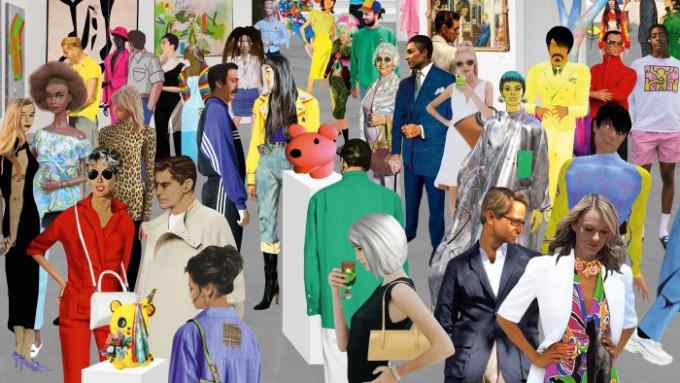
Comments